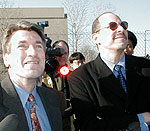By William Wilcoxen
Minnesota Public Radio
February 7, 2002
The Alabama businessman who wants to buy the Minnesota Twins got a first-hand look Wednesday at a potential ballpark site in downtown Minneapolis. Donald Watkins has said if he buys the Twins he would build them a new stadium with private financing. Watkins is saying little, though, about what progress he's making toward purchasing the team.
| |
|
|
|
||
The sun shone brightly on Donald Watkins' visit to Minneapolis, warming the air to an un-winterlike 40 degrees. And it reflected off the smiles and camera lenses in the Rapid Park parking lot on the western edge of downtown. That's where Mayor R.T. Rybak waved his arms while extolling the virtues of the location.
"You see 6,000 parking spaces in view and 10,000 within walking distance, you see an interstate freeway system, you see a light rail connection, a bus hub across the street, the North Star corridor to my back," Rybak said. "For an entrepreneur who wants to help keep baseball in Minnesota, this is an unparalleled opportunity."
Watkins himself was guarded in his remarks to reporters. He revealed little about how close he might be to buying the Minnesota Twins and building them a new home. He was mostly sunny about the Twin Cities.
"I wanted to get information from Minneapolis officials on available sites for a new baseball facility. My schedule and the mayor of St. Paul's schedule did not permit a meeting in that city. But this has been a very positive day for me. I've learned a whole lot. I appreciate your interest and I'm sure you'll see us on many more occasions in the future," Watkins said.
Watkins says confidentialilty agreements prevent him from getting into any details regarding his prospective business ventures. He reiterated that purchasing the Twins and building a ballpark are the top priority for him and his staff. He said nothing, though, to quell skeptics who are raising doubts about whether Watkins really has the money and wherewithall to bring his baseball vision to reality. Most of Watkins' investments are in privately held firms and estimates of his wealth vary widely.
As he left the Rapid Park lot, Watkins indicated only those with a legitimate reason may scrutinize his bank book. "There's a process for me to address money questions with the people who make decisions in the process," he said. "And I try to focus on carrying my burden of proof and burden of persuasion with the people who have to make decisions."
After spending a good chunk of the day with Watkins, Rybak declined to vouch for the businessman's legitimacy. For the time being, at least, the mayor is leaving it to others to verify Watkins' credibility. "I think there are a lot of issues about that and it's not my job -- yet -- to make a judgment on that. There are a lot of folks doing all of that work and I respect that work and they'll keep working on it," he said.
Valid or not, Watkins' assertions that he has the capacity to buy the Twins and pay for a new ballpark are influencing the debate over the team's future.
At the Capitol, the question of whether to put state money toward a Twins stadium has become a perennial debate, but not one that's necessarily popular among lawmakers. That's why Watkins is such an attractive alternative.
Gov. Jesse Ventura has said that if Watkins can relieve state policymakers of the need to fund a stadium, he will personally shovel dirt for the new, privately funded ballpark. On the day Watkins was scouting a Minneapolis parking lot, the governor was hailing the bright prospect that his purchase of the Twins might end the debate over the team at the Legislature.
"If Donald Watkins buys the team and builds a stadium with private money, then it's all for naught. Then we don't have to worry at all about," Ventura said. "Like I said, the only thing I have to worry about is make sure I've been to the chiropractor so my back's in good shape when I go over and help him start digging."
Ventura now says, however, that if necessary, he's willing to consider ballpark legislation in a special session. A task force recently recommended state financing for a ballpark and a football stadium to be shared by the Minnesota Vikings and University of Minnesota. The panel said lawmakers should look to user funding and not tap general fund revenue.
Legislative leaders have said they would take up the ballpark question only after first dealing with other issues, including redistricing, solving a budget shortfall, and funding state building projects.
More from MPR

